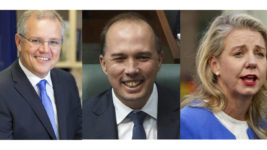Should Politicians Be Personally Liable for Acting Unlawfully?

Former Sports Minister Bridget McKenzie could be personally liable for making sports grants without lawful authority, with serious questions raised about whether she was authorised to approve grants that were handed out to ‘targeted electorates’ the lead-up to the last federal election.
The story so far
If you haven’t been following the story, The ‘sports rorts’ scandal came to light several weeks ago when it was discovered that former Sports Minister Bridget McKenzie gave the go-ahead for $100 million worth of sports grants, of which 43% were ineligible for the money.
It also came to light that a disproportionate amount of that money was handed out to sporting clubs in marginal and other targeted electoral seats.
There were also revelations that Ms McKenzie gave a ‘leftover’ $150,000 of taxpayer funds for a study into the benefits of shooting, instead of giving it to assist intellectually impaired athletes at the INAS Global Games in Brisbane, which eventually received funding through other government avenues.
The government was accused of trying to ‘buy votes in targeted areas’ and the PM quickly disassociated himself from the scandal, preferring to state that everything was ‘above board’ rather than answering specific questions. But many questions remain unanswered and a Senate Inquiry is now trying to uncover exactly what criteria was used to determine how grants were awarded, as well as whether appropriate guidelines were followed.
Ms McKenzie has since resigned.
Personal liability
Now, legal expert Geoffrey Lindell, an emeritus professor in law at the University of Adelaide, has told the Senate Inquiry that Ms McKenzie could be personally liable for failing to seek advice about whether she had the legal authority to give out $100 million of sports grants.
He submitted that he has ‘serious doubt’ that Ms McKenzie had authority to approve the grants; a submission which echoes concerns by the Australian National Audit Office (ANAO) and other experts, including professor Anne Twomey, a law professor at Sydney University, who has in the past acted as a consultant to various government departments.
The crux of the issue appears to be who really was making the decisions, and right now, everyone is ducking for cover. The PM has intimated that his office only had a passing interest in the grant allocation. But the ANAO has since discovered that 136 emails were exchanged between the Sports Minister’s office and the PM’s department, some involving key staff members in both.
136 emails and a spreadsheet
A number of these emails had attached a colour-coded spreadsheet of the intended grant allocations. Changes were made to the final round of grants on April 11, which Ms McKenzie says she was unaware of. She says she made no changes to the brief and attachments after 4 April 2019.
“My expectation was that the brief would be processed in a timely and appropriate manner. Nevertheless, changes were made and administrative errors occurred in processing the brief,” she says.
ANAO has told the senate inquiry that: “On 10 April 2019 the minister wrote to the Prime Minister attaching printouts of two worksheets within the spreadsheet – the list of projects she intended to approve for round three funding and the worksheet with the summary tables (of distribution by state, political party and electorate).”
The ANAO also says that Senator McKenzie signed a formal brief to Sports Australia with a printout from the spreadsheet to ensure her decisions on the grants took priority over the independent agency.
The guidelines for the community sport infrastructure grant program say the minister was the final decision-maker, and the attorney-general has defended Ms McKenzie’s conduct by arguing it is a minister’s discretion to direct their department, but this remains in question, with Mr Lindell arguing that the minister had a power to set “practices and policies” but that did not allow her to supplant Sport Australia as the decision-maker.
Legal challenges possible
Several law firms have already threatened to bring legal challenges, and if they succeeded the minister’s decisions would have “no legal effect” and Sport Australia would have to decide the grants, from scratch, with a clean slate.
Mr Lindell also noted in his submission to the senate inquiry that the Public Governance Performance and Accountability Act could allow the commonwealth to recover grant money from McKenzie for “loss of relevant money”.
However, …”For this liability to be established it would have to be shown that the payments resulted from her [Ms McKenzie’s] ‘misconduct or by a deliberate or serious disregard of reasonable standards of care’.”
Mr Lindell also pointed out the “little explored possible criminal consequences when public officers don’t comply with statute law, particularly when done with full knowledge of the facts.”
There are calls for Ms McKenzie should be censured by parliament for failing to check if she had legal authority to give grants.
Who’s telling the truth?
And while the senate inquiry continues, and questions that remain unanswered, one thing is clear: there is a dark cloud of doubt and uncertainty hanging over the government currently, amid these very serious allegations of misuse of public funds.







